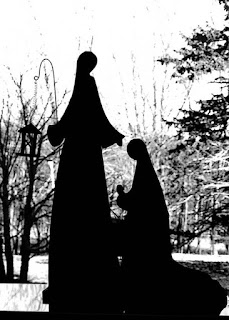Is 40:1-5, 9-11
Ps 85:9-14
3 Pt 3:8-14
Mk 1:1-8
In a meditation for Advent posted two years ago, Portuguese Jesuit Father João Vila-Chã wrote:
"(Advento é) Um tempo.
Tempo para aprender a dar tempo ao Tempo;
tempo para ter tempo;
tempo de quem espera, no Tempo!"
'Advent is a time.
Time to learn to give time to Time.
time to have time.
time during which we await in Time.'
Time has a different meaning in the Kingdom of God. The Church becomes particularly aware of this difference during this season of Advent as She approaches the great Feast of the Nativity of Our Lord.
We heard in the first reading, "with the Lord one day is like a thousand years
and a thousand years like one day. The Lord does not delay his promise, as some regard delay." God exists above time and within time time that is both immediate and unbounded. God transcends time no matter how much we try to impose limits or deadlines on Him. God enters into time with us and for us. In advent we become conscious of the kind of time John described in the prologue to his Gospel:
"In the beginning was the Word
and the Word was with God
and the Word was God
He was in the beginning with God . . . ."
John is describing He who had no beginning and who will have no end. The Prologue transcends the pitifully inadequate concepts of time created by man so as to mark his short journey on earth:
"In the beginning was the Word
and the Word was with God
and the Word was God
He was in the beginning with God . . . ."
These few verses could consume one's meditation for months if not years.
The Advent readings from Isaiah concern time. They describe an indeterminate future time with no indication as to when that time will come, with no indication when the promise will be fulfilled. And thus the problem. Indeterminate time was a source of anxiety for Isaiah's readers. I suspect this anxiety was one of the factors behind the frequent violations of the covenant, of loss of faith, a reversion to paganism. Uncertain time remains a source of anxiety for us, particularly during this time of pandemic.
Humans do not tolerate uncertain time well. We don't cope well with time that has no beginning and no end. We are more anxious about future events if we do not know the day, date, place, and hour at which the event is to occur. Imagine receiving an invitation that did not include a specific place, time, reason, or any other details about the particular event.
The Japanese-British author Kazuo Ishiguro, winner of the 2017 Nobel Prize for Literature, imagined precisely that in his novel 'The Unconsoled.' The novel relates the story of an unnamed pianist arriving in an unnamed Central European city where he was to give a concert on an unknown day, in an unknown venue, playing an unknown program.
The book is deeply disturbing because there are no anchors in time or geography. It is a study of uncertainty and the anxiety that comes with not knowing. The sense of anxiety caused by the narrative is instructive and horrifying at the same time. I had to put the book down frequently in order to get a grip on the anxiety it was causing.
We are living that dystopian uncertainty today as we try to cope with the uncertainly of the covid pandemic. Nothing is definite. Time is being bent in ways we cannot comprehend. When will it end? What does two weeks of quarantine feel like? How long has it been going on now? Do any of the government officials really know what he or she is doing? (NB: It doesn't appear so.).
Early on in the pandemic I was scrolling through Facebook when I burst out laughing. The childhood mnemonic most of us learned so as to remember the number of days in each month had been adapted. "Thirty days has September, April, June, and November, all the rest have 31, except March which has 3000 . . ."
Isaiah was written somewhere around the 8th century BC.
The parts we hear during Advent describe a time to come, a time that approaches the idyllic, a time in which God will make Himself known. It will be time when God will no longer be hidden. But Isaiah gives no indication of when. Thus the anxiety.
At vespers, or evening prayer, on December 17 the Church will begin a unique marker of time when she chants the first of the seven "O " Antiphons that introduce the Magnificat. The antiphons proclaim the coming Christ as the fulfillment of Old Testament hopes, as well as the fulfillment of our present hopes. The word "veni" "Come!" in the last phrase of each antiphon Veni emphasizes our longing for the Messiah, our waiting in time and space. The last of the antiphons will be chanted on December 23 the final evening of advent.
Even this year, despite the uncertainties, during advent we live in the luxury of Time:
'Tempo para aprender a dar tempo ao Tempo;'
Time to learn to give time to Time; time to the God who transcends Time
'Tempo para ter tempo;'
Time to have time; time for prayer, contemplation, and the gift that is Jesus.
'Tempo de quem espera, no Tempo!'
Time during which we await in Time; time during which we await to be enfolded within the embrace of the God of eternal Time.
"In the beginning was the Word
and the Word was with God
and the Word was God
He was in the beginning with God . . . ."






No comments:
Post a Comment